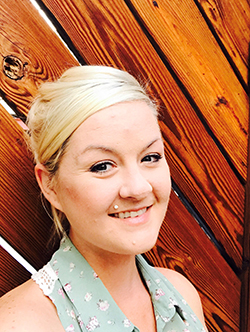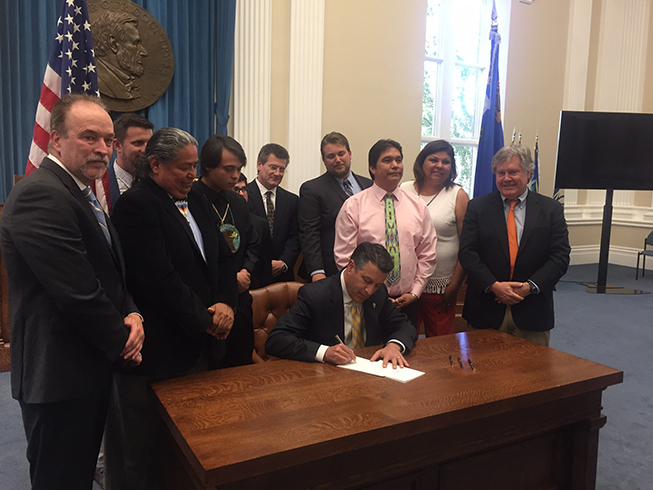Tribal Cannabis Consulting’s Co-Founder Cassandra Dittus shares the company’s work to help tribes establish their own cannabis businesses.
Original Article: https://www.cannabisbusinesstimes.com/article/consultancy-helps-tribal-communities-in-cannabis-industry/
As tribal communities work to get involved in the cannabis industry, getting to a point where a tribe can license its own businesses and issue its own medical marijuana cards is a huge accomplishment, says Cassandra Dittus, co-founder of Tribal Cannabis Consulting, a national firm specializing in Native American cannabis policy.
And Dittus’ business has helped tribes do just that. With the Ely Shoshone, Yerington Paiute, Pyramid Lake and other Nevada tribes successfully establishing compacts with Gov. Brian Sandoval, her work has been crucial to establishing regulatory codes to allow tribal governments to create internal medical marijuana frameworks and business plans, as well as line up investment opportunity—all while protecting tribal sovereignty.
“They’re strong leaders and strong tribal councils that are seeing the opportunities in front of them and moving forward into the unknown, but doing it because they believe they can do good for their communities,” Dittus says.
 Dittus (pictured left) jumped into the cannabis industry nine years ago after a seven-year with cancer and multiple bone marrow transplants, clinical trials and chemo radiation.
Dittus (pictured left) jumped into the cannabis industry nine years ago after a seven-year with cancer and multiple bone marrow transplants, clinical trials and chemo radiation.
“That was where I started taking an interest and immediately saw it as something that I knew I wanted to do,” Dittus says. “I pursued it. I met a guy who was just opening a dispensary shortly thereafter and called him every day for three weeks for a job, and that is where we landed.”
Dittus started in an administrative capacity at a Colorado-based dispensary and over time, saw the unregulated dispensaries transition into licensed businesses in the first stages of regulation in the state.
“[I started] understanding the foundation of how that process worked, how it was developed, [how] each regulation means something different and though it may be a sentence, how it actually applies into your facility is completely different,” she says. “When we got to the tribal capacity of things, I had gone through the whole gamut of … medical to recreational.”
Establishing a Regulatory Framework
Tribal Cannabis Consulting has helped the Ely Shoshone, Yerington Paiute, Pyramid Lake and other Nevada tribes establish compacts with Gov. Sandoval under SB375, which Dittus helped write. The company helps tribes develop regulatory codes that allow their governments to establish internal frameworks for medical marijuana programs, including the structure, implementation and options for business plans.
“They are sovereign nations, so they need to create this framework for themselves, but then they also need to be able to go into the surrounding communities and work with that surrounding state in accordance with their laws, as well,” Dittus says. “A lot of consultants can build a business, but it’s really about the specialty work with the actual program that’s helping the tribes be more successful in this.”
SB375 allows Nevada’s governor to negotiate compacts with the state’s tribal leaders and tribal councils, while permitting cross-jurisdictional commerce and regulatory compliance. The bill was carefully written with the help of Tribal Cannabis Consulting to ensure no sovereignty was stripped from the tribes.

Gov. Sandoval signing SB375 into law with Sen. Tick Segerblom, Yerington Paiute Chairman Laurie Thom and Pyramid Lake Paiute Chairman Vinton Hawley among those in attendance.
“At the end of the day, we did a great job passing it,” Dittus says. “We did one amendment in the beginning, and then passed it all the way through. I think through the entire process we ended up with three ‘no’ votes and one abstention, and then almost unanimous moving forward because everyone saw the benefits of having the tribes be able to use these monies for economic development throughout the state of Nevada.”
When the first tribes had success establishing compacts with the state, Tribal Cannabis Consulting urged all tribes they were consulting with to get their compacts in place while the governor’s office is willing to work with them.
“We don’t know who the next governor’s going to be, we don’t know what that scenario’s going to look like, but we know that we have a governor who’s been very supportive,” Dittus says.
Building Businesses
Tribal Cannabis Consulting works within individual tribes’ treaty rights, available land and resources, and a contract can be anywhere from five to 25 years, Dittus says. The company has built out both commercial grows and dispensaries.
“Cultivation-wise, a lot of it lies in facility design,” she says. “It goes into lighting, security, HVAC—the normal [process,] as far as cultivation build out—but a lot of it on the logistical side comes down to operating procedures, how to work within your regulatory guidelines, and then best practices, as well.”
Each of the company’s contracts includes tribal hiring preferences, Dittus says, offering the tribal community an opportunity to build economic development. Tribal Cannabis Consulting allows employees to work in facilities for hands-on training, which helps growers connect with other growers to learn techniques and best practices.
“If you don’t care about that human resources component, a lot of the other pieces are not going to come together,” Dittus says.
Tribal communities face many unique challenges as they launch and operate cannabis businesses, Dittus says, including the fact that much of their funding comes from federal entities. Tribes must isolate cannabis projects from the federal funding they receive, and financing can be tricky, especially when most of their economic development comes from small businesses that cannot necessarily support the launch of a large cannabis operation. Tribes often struggle to ensure financing comes from legitimate sources and that funds are put to good use once secured, Dittus notes.
Navigating the different types of tribal lands is another obstacle, she says. Tribes have trust and fee lands—trust land is held in trust by the federal government and fee land is purchased and put in the tribe’s name.
“The federal government does have certain rights to [trust land], but there are a lot of cases and precedents that have been set … to say that the tribes have the jurisdiction to govern these lands, i.e. creating their own recreational and medical marijuana programs and licensing them and regulating them and so on and so forth like the states do,” Dittus says. “The clarifications at the federal level will come down at some point, but the tribes right now rely on that sovereign territory component to build these programs on.”
Land and financial resources are often the most difficult challenge to meet, she adds, because Tribal Cannabis Consulting does not want a tribe to start a project with multi-millions of dollars of debt owed to an investor. Rather, the company strives to start with a basis of proof of concept, and ensures a solid groundwork of regulatory and logistical components are in place before investing the tribes’ and company’s money into a business.
Companies looking to secure investors and funding should not be deterred by challenges, Dittus says, and they must remain diligent and think outside the box.
“When you want to present something to someone, they don’t need to hear that you’re just another dispensary,” she says. “They need to hear why it’s going to be unique and successful and what kind of innovation you’re putting into it. I think innovation is really the key to pretty much everything in this industry because in my experience, in almost ten years in the industry, the most important thing that I’ve seen is people that can find a window when a door is slammed in their face.”
Long-term success in the cannabis space, Dittus says, is not shying away from problems and not getting discouraged.
“We’ve pushed through a lot of things, and I think what you have to remember is that the challenges aren’t over,” she says. “It’s not federally legal. The scary moments aren’t over. And if you’re not willing to take those scary moments and push through them and keep your strong backbone … through that, then it’s going to be a struggle for you because it’s not just easy anymore.”


